Deadly silence
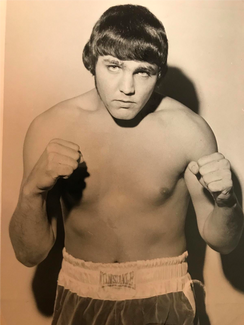
With Britain in the foothills of the second wave of the coronavirus pandemic, Jake Bowers investigates the impact the pandemic has had on the Gypsy Roma and Traveller community.
In June 2020, as Britain began to lick its wounds from the first wave of the Coronavirus pandemic, an analysis of the many names and faces that made up 40,000 fatalities confirmed what doctors already knew: people from ethnic minorities were up to twice as likely to die from Coronavirus than those who weren’t. Top of the list for whom Coronavirus was more likely to be lethal were British Bangladeshis and others of South Asian heritage. But what about Britain’s 600,000 Gypsies, Roma and Travellers? Six months into the pandemic, as Britain enters the foothills of its second wave, Travellers Times can reveal that the government still isn’t counting.
Each week Public Health England reveals the grim rate of death and infections and people. As Britain enters the second wave of the pandemic, it’s graphs are splashed our TV screens and newspapers. But drill down into its weekly surveillance report and you will find there’s no mention at all of the impact of the virus on the Gypsy, Traveller and Roma communities. Our lives are counted under “other ethnic group” second only to British Pakistanis with an infection rate of around 80 people per 100,000 people. Public Health England declined to provide any more information but confirmed simply that Gypsies and Travellers “are included in that data set.”
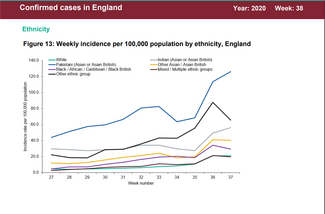
But while the effects of Coronavirus on the Gypsy, Roma and Traveller community might be invisible in the work of some of the public bodies charged with managing the pandemic, the effects have left deep scars in the memories and bodies of community members themselves.
No deeper loss has been felt than that of Les Stevens, a proud Romany man who died of Coronavirus in April at the age of 69. “He was known as Big Les, boxer, trainer, father, granddad and the man at the very heart of a boxing gym for 40 years.” says Boxing journalist Steve Bunce. “He retired from professional boxing in 1979, finishing with 23 wins and just five defeats. And then he became an iconic figure as the man in the corner at Pinewood Starr, the trainer of champions, as many as 200 over a nearly 40-year period in the gym.” History illustrates exactly how quickly the virus can take advantage of community events to spread right through the community.
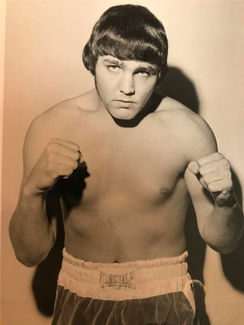
Ironically, Les is thought to have contracted the virus at a wake for Gertie Frankham, wife of his friend and fellow Gypsy boxing legend Johnny Frankham. “I can’t be sure, but when Aunt Gertie died my dad went and sat up with her,” says Big Les’s son Les Stevens. “Within a week he didn’t feel himself but carried on. He owned a scrap yard and he took great pride in it.” But one morning when Big Les couldn’t get out of his bed, his family had to break down his bedroom door to get him to hospital.
With Big Les in hospital many of the young men he coached implored him to win the fight of his life, recording video messages of encouragement. “When all these messages came I was both proud and heartbroken that he couldn’t hear those messages,” says Les junior. From the moment Big Les went into hospital Les never saw him again but spoke to him on the phone. The former heavyweight fighter fought for his life on a ventilator for two and a half weeks before succumbing. “All I needed was to see him and tell him to go just one more round, but I wasn’t allowed. It just killed me because we couldn’t see him or give him a proper send off. Without dad we are nothing.”
With Britain entering a second wave of coronavirus Les fears the community is not taking the threat of coronavirus seriously enough so has temporarily closed the Pinewood Starr Boxing Club that was his dad’s legacy because he fears it will infect more of the community.
“Some of the young men in the community are not taking it seriously at all.” Says Les, “I swear they don’t realise what pain there is coming. It hurts me to see my own people not take it seriously. My dad was a very healthy man, he was 69 but as fit as a 50-year-old. He never put a fag to his mouth, but he just couldn’t beat it.”
“I feel like shouting at them what on earth are you doing. What they don’t realise is that they are giving it to the old and vulnerable. When you’ve lived through what I have you would take it more seriously.”
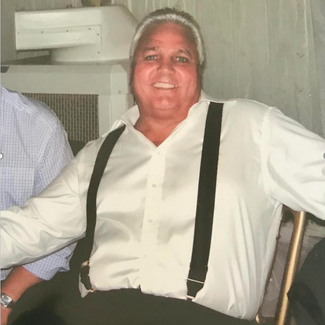
Les’ close friend John Frankham is one Romany man who has taken on the virus and lived to
tell the tale. It was his mum’s funeral where Big Les is thought to have contracted the virus.
“Me mum passed away, so I think I got it at the funeral too,” says John “I was bedridden at
home for 7 – 8 days and I had it with double pneumonia. I couldn’t even walk to the toilet,
every time you breathed was agony. I was bad because of my mum, they put me straight in
hospital and then my dad had it.” Luckily John’s dad Johnny, famous Romany sparring
partner of Cassius Clay also beat the virus after spending time with John in Frimley Park
Hospital in Berkshire. When they got out they bought a truckload of food and other gifts for
the NHS workers that had saved their lives.
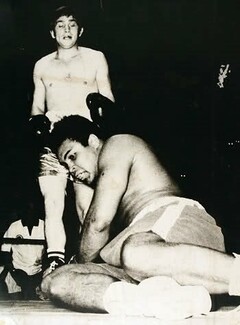
But what was having the virus like? “The pain of when you are breathing was horrible, it’s
like breathing in boiling hot ash. Every time you take a short breath it burns. I wouldn’t wish
it on my worst enemy. My dad tried to get me out of bed, he had it for about a week and a
half. But he got over it. Les Stevens got it real bad and he was a big strong man. For him to
get it, you’d think nothing would touch him. Even the vicar at my mum’s funeral got it!”
John says his friend Bill Saunders also got the disease and was one of the very few to have
gone on a ventilator and come off again.
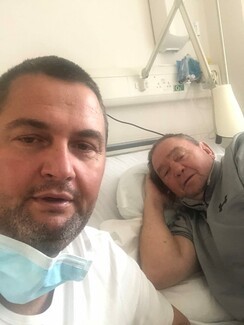
So what does John make of those Gypsies and Travellers who have bought into the conspiracy theory that Coronavirus is a hoax designed to clamp down on people’s freedoms? “There’s conspiracy theories about everything,” says John “But I’ve never been in hospital before and it caused me to lose 3.5 stone in 2 and a half weeks. It was the hardest job to just get of bed and it has scarred my lungs.” For him the experience was so real that his breathing still hasn’t fully recovered.
In other parts of the country people have drawn upon their ancestral cultural values of the
need for cleanliness to successfully keep the virus at bay. Gloria Buckley MBE runs three
Gypsy caravan sites across the East of England. Like many sites, residents where very quick
to put up barriers not allowing anyone on their camps, and only nominated people off. They
drew upon a deep-rooted passion for cleanliness required to survive on the outskirts of
society during every pandemic from the Bubonic Plague to the Spanish Flu. “You never see
much of our lot get food poisoning,” says Gloria. “There weren’t many Gypsy people that
died of the plague because they knew all about the importance of cleanliness.”
Gloria’s site manager Rebecca Gallagher, who runs the Gypsy site in Cottessey near Norwich agrees. “We put a barrier up. If you were the designated shop goer, you had to wash everything. We isolated to our own pitches and we also didn’t go on to one another pitches. We were mingling but socially distancing. That’s how everyone has done it.” The virus came close but doesn’t seem to have made it past the defences. “It was in an estate across the road. It was right around us, so I took the decision to block us off. It’s just a case of cleanliness.”
But across the country, straddling the English/Welsh border comes another cautionary tale of how the virus can strike when a community’s guard is down. In July an engagement party at the predominantly Irish Traveller site in Craven Arms, Shropshire resulted in the whole site being put into quarantine. The widely accepted theory is that the virus originated on another site in Welshpool, just 25 miles away in Wales.
The widely accepted theory is that the virus originated on another site in Welshpool, just 25 miles away in Wales. “One person tested positive on the site” says John Taylor, Senior Gypsy and Traveller family officer at Shropshire Council. “As soon as we found that out we set up a testing station. The majority of the site attended, and 20 tests came back positive, so the entire community went into quarantine.”
John says the council worked together with other agencies to provide food, electricity top-ups, gas and even tobacco to the residents. After another round of testing, of the estimated 60 residents of the site a total of 31 were positive.
“Some came back negative as well,” says John. “They were all asked to self-isolate because
the whole site is one extended family they was treated as one household.” In the heatwave
of July, the community sat it out as best they could to contain the virus. “During that hot
period, people really wanted to get out and about, but they didn’t. The families were
superb, and everybody complied in the end. There were no hospitalisations, some people
were ill, and some showed no symptoms,” says John.
But as any boxer will tell you as soon as your guard is down, the enemy can strike. Irish
Traveller activist Richard Sheridan confirms that he’s hearing of more and more cases in his community. “A lot of Travellers are getting it now,” says Richard. “Both in this country, in
Europe and back in Ireland. But with this second wave coming people really start having to
listen to the advice and follow the rules.” To date he knows of only one fatality. “Christy
Joyce on the site Oxford died of it back in April,” says Richard.
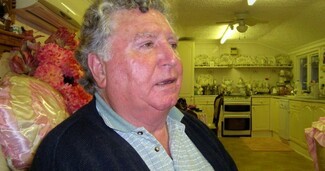
By Jake Bowers
In the second part of his investigation next month Jake Bowers will look at the health and economic impact on Britain’s migrant Roma community and how the Gypsy, Roma and Traveller communities have given back to the public health system.